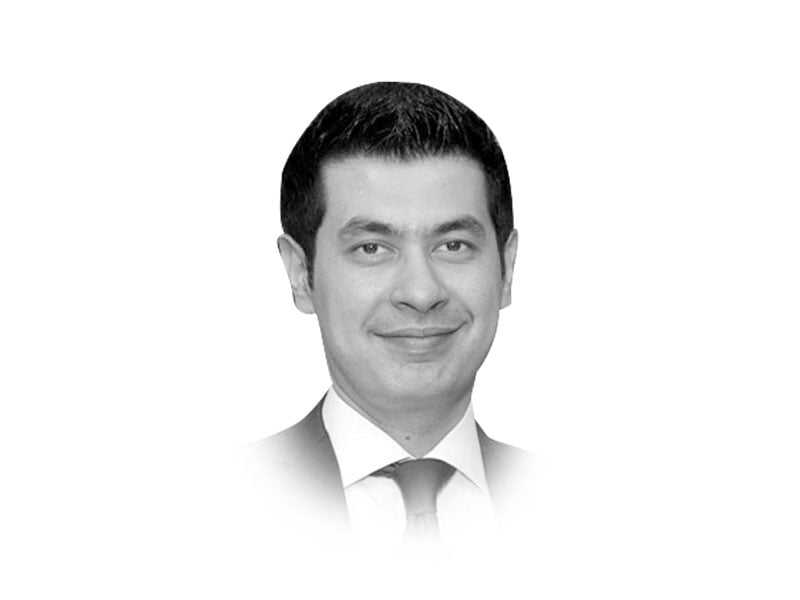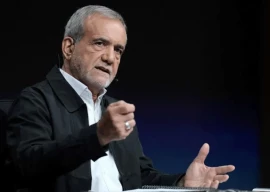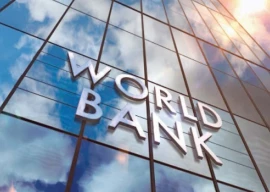
The market is in a frenzy. Long-time hoarders are opening up the coffers, trying to cover future losses. Greedy investors are picking up the fresh greenbacks and traders, well, they’re having a field day, aren’t they?
But it didn’t make sense for a few days. Nothing about Pakistan is reason enough for the currency to record any kind of gain. There’s not much happening for Pakistan on the horizon either –– if all things go according to plan, it should be another horrible year.
And finally the cat jumped out of the bag –– the Saudis had come to the rescue of the PML-N government, with a massive $1.5 billion gift. Obviously, talks for the monies had been underway for a while and once in the final stages, the market started reacting.
So now, we’re talking about a resurgent economy, a strong currency, and other terms which actually are miles away from the truth. Pakistan remains in a shambles and a total collapse has only been postponed by yet another life-saving Saudi injection. But let’s not kid ourselves, Shylock will ask for his pound of flesh (at home and abroad), and Pakistan is no Antonio.
What does Riyadh want now? As it so happens, the royal family in Riyadh is under a fair amount of pressure. It has been losing support in the Middle East of late, especially with regard to the Syrian crisis and the instability in Egypt. At the same time, its relationship with the United States has also been in rough waters recently.
First, the Middle East. One of Riyadh’s greatest worries is the creation of a Shia crescent, able to somehow threaten the dominance of Saudi Arabia in the Gulf Cooperation Council (GCC). As the situation in Syria worsened, the Saudis decided to use their Libyan formula of using proxy militias to topple Bashar alAssad. Yet, the Syrian army, backed by Tehran, Moscow and of course, Hezbollah, dug in their heels and as the war raged on, it soon became apparent that the Saudis were funding, to put it mildly, al Qaeda-like militants. Yet, Washington remained quiet.
The Saudis were still desperate to break the Syria-Iran-Hezbollah axis and they literally begged the United States and Nato to intervene. However, Tel Aviv called time out on this intervention out of fear of Syria falling to al Qaeda and other jihadists. At the same time, the impasse on the Iranian nuclear programme happened and it became apparent that the status quo had finally been broken.
Washington’s silence on Riyadh’s funding of terrorism has been terrifying, but its reasons have always been economic. However, US demands for imported energy are waning. Add to this, Tel Aviv’s fears of Saudi-backed militants reaching its borders, and the relationship between Saudi Arabia and the United States is now fast unravelling.
It is under these developments that the House of Saud has turned to Pakistan. The reasons are clear: to ensure that a Muslim country outside the Middle East remains firmly in its grasp. And Pakistan, in true form, has responded. First came the U-turn on Syria: Pakistan has traditionally maintained a stance of non-alignment when it comes to matters in the Middle East, but in mid-February, following talks between PM Nawaz Sharif and Saudi Crown Prince Salman bin Abdul-Aziz alSaud, it changed to “the formation of a transitional governing body with full executive powers enabling it to take charge of the affairs of the country”. Pakistan also called for ‘an immediate withdrawal of all foreign armed forces and militants from Syrian territory. Many believe that this is a reference to Iran and Hezbollah.
What the House of Saud wants from Pakistan is speculative at best since Pakistan cannot directly influence events in the Middle East. However, Riyadh can take arms from Pakistan and funnel them to jihadists in Syria.
Pakistan could have played it so differently. While towing the Saudi line was, perhaps, inevitable, it could have learnt from its past mistakes (read: Afghan jihad) and instead of hard cash, bargained for something more long-term and sustainable. Yet, here we are, for a few dollars more.
Published in The Express Tribune, April 2nd, 2014.
Like Opinion & Editorial on Facebook, follow @ETOpEd on Twitter to receive all updates on all our daily pieces.
COMMENTS (15)
Comments are moderated and generally will be posted if they are on-topic and not abusive.
For more information, please see our Comments FAQ

1731637727-0/Bear--(1)1731637727-0-165x106.webp)

1731619853-0/ice-cream-(1)1731619853-0-165x106.webp)













More than a few days and the Pak rupee is still up so how do you explain that! I am sure Pakistan must appear like a shining star compared to the instability and unrest in Egypt and other Arab states. Egypt is the one that not only took Saudi Arabian money but Gulf money to prop up army rule there - not Pakistan.
@Manhattanite: Tundra Fonder from Sweden has been positive on Pakistan as an emerging market and is making good money but there are several other funds too. You should look up business articles on the New York Times and the Wall Street Journal on Pakistan's stock market for the last year but perhaps you should read the MSCI news this week which advises global investors on markets across the world. They are upbeat on Pakistan; Here is the link,
http://www.dawn.com/news/1097353/msci-doubles-pakistan-weight-to-84pc
PS As someone associated with Stanley Morgan, they may not take kindly to the typo in their company name.
@Maria: Which banks recommended investments in this country? The Western Investments banks... None did. Not one. Goldman Sachs,..Morgan Stanly [I am associated with them] JP Morgan Chase, Citi Group, Credit Suisse, Deutsche Bank. B of NY Mellon,..Wells Fargo,..Merrill Lynch... Please tell us which banks recommended these investments. That made you so pleased.
@truthbetold: Those who know of the House of Saud should know that it is a giver and not a taker. It gives its energy to the industrial world even to some who have no cash to pay, it gives aid to those in need and does not discriminate between the rich or poor, strong or weak, good or bad as long as they do not turn around and show their back to them. Saudi Arabia has the vast energy of cosmic energy reserves and still unexplored mineral wealth which no other country in the world can match. It is a land of Prophets and their families, where the infant rubbed his heals and the water spurted out of the sand. It is the birth place of the homo sapiens which spread across the world that we know today.
Rex Minor
"What does Riyadh want now?"
The real answer has the words "fission" and "fusion" in the deal between Pakistan and Saudi Arabia.
@Islooboy: Pakistan has to deal with both the Saudis and Iran but both of those countries are worse off than Pakistan. The days of Saudi's authoritarian rule may be coming to an end but Iran seems forever on the verge of a rebellion by most people there who are sick of theocracy. So Saudi Arabia is in as bad a state as Iran. Iran caved in to Western demands and is desperate to engage with the West despite all of its bluster. Iran is about to implode anyways under the weight of Western sanctions. The majority of Iranians both in that country and abroad tell of the misery there. It seems that Iran has only been punching itself in the face as you say for the past decade. Any nation, Pakistan included will seek to gain trade and commercial interests from both nations but the world knows that the future for both Iran and Saudi Arabia is not looking good.
Contrary to most of the comments, this is an excellent geopolitical analysis. Saudis are very cunning and they have realised that the religious game that they are playing since the 17th century is now to end. Hence, they are in hurry to scout the partners. It was only good for pakistan not to have sided with the Saudis, since Iran will pack a solid punch in Pakistan's face.
well said. solid article. glad to see free media in pakistan delivering, while our government falters.
Those of us who live in North America are pleased with the positive press that Pakistan is receiving nowadays. In terms of the economy, the consensus from Western financial analysts is that things are getting better which is why more Western fund managers call Pakistan a good market. This was going on months before the appreciation of the Pak rupee and the injection of Saudi cash. The rupee has not only increased in value to the dollar but also in comparison to other regional currencies which tells you there is investor confidence in the Pakistani economy now. Rather than try to put down Pakistan's improving indicators, some Pakistani writers want to discount everything that is happening. I don't think Pakistan promised anything to Saudis anyways so it's pointless to guess. They have always helped even with fuel subsidies. You too need to read some Western media reports on Pakistan's economic improvement from GSP Plus, Chinese investment,foreign ratings and more.
This quasi-analysis- full of platitudes, ambiguous references to economic fundamentals, drivers of regional security, and alternatives available to Pakistan- is exactly why we are in this policy mess.
Where is the fully spelled-out knowledge of and prescription for policy? Where is the crispness of thought which could really jog us out of this mental fugue we are in, blindly following policies neither of our making nor fully thought-through?
I am pretty sick of reading op-eds just parroting what's already been said in the broadest of terms. Enough of your two pennies; say something meaningful please.
The author forgot to mention,..this country's over 10,000 plus military and ex military personnel deployed and employed in Bahrain.